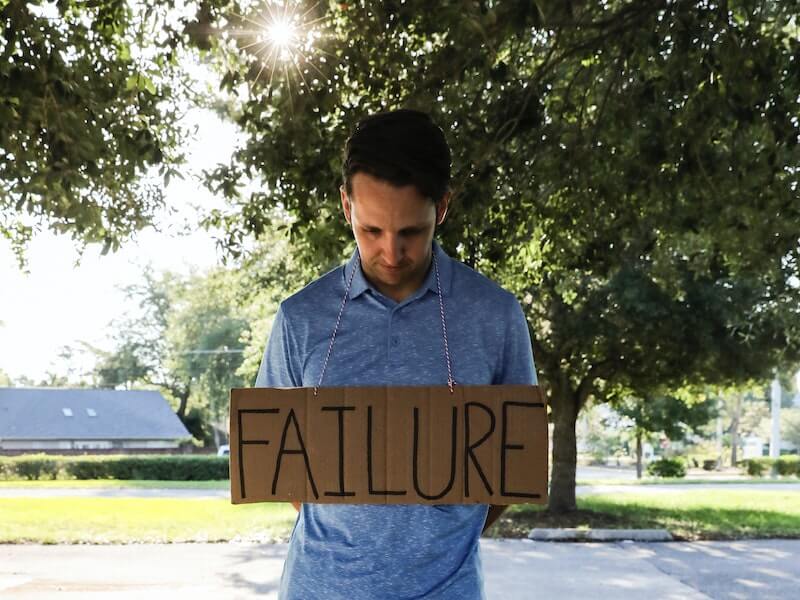Fear of Failure
How To Face The Fear of Failure

‘Do you suffer from Atychiphobia?’
When you think about your goals, your to do list or objectives, do you get sweats, a gnawing sense of panic, an inability to move and, eventually, complete paralysis.’
Atychiphobia is the fear of failure.
And you can beat it.
Recognising your emotions and behaviours
Overcoming your fear of failure starts by recognising the emotions and actions that accompany them. What are your feelings, that sense of dread and how do you behave? Do you start procrastinating, putting off the activities that you (logically) know you need to do, make excuses in your head or out loud ("I'm too busy, I'll do it tomorrow, I need to learn more skills").
Naming your fear is the key step to dealing with it.
Addressing you fears logically
Once you've recognised the fear, logically address it by asking a few questions.
What are the risks?
It's very important that you write them down. Humans are biologically programmed to focus on risks (rather than benefits) and for many of us, that becomes a formless dread rather than specific list. By writing down the risks, you can address each one in turn. Some you can mitigate, others you might simply have to accept. But as a general rule, once your risk are written down, they never look as bad as you imagine.
What is the worst that can happen?
In project management, there is a process where you assess each risk based on likelihood and impact and assign it a rating value. For example, if a risk is likely to happen (score of 4 out of 5), but the impact is minimal (2 out 5), then risk rating is 8 (4 * 2). How you judge likelihood and impact is entirely up to you but Google will give you lots of guidance. Once you've assigned ratings to all of your risks, you can then decide on ways to reduce that risk happening ("risk mitigation"). Looking at your risks through this process can help you take control.
What happens if I don't do it?
One of your risks should be doing nothing. Put it through the same rating process.
What skills or knowledge am I missing?
As part of your risk mitigation process, you may recognise the need to learn some new skills, or gather further information. Assess what impact that will have on your risks, and then add that to your 'to do' list.
Addressing you fears emotionally
Having addressed your fears logically, you now need to address them emotionally. Ask yourself a few questions.
What will achieving these objectives mean to me?
How will you feel when you have achieved this goal? What are the tangible benefits? Write it down and hang it up. Achieving hard goals is never easy and there will be times when you struggle and wonder why you're bothering. When that happens refer back to this list.
Will the people I love feel differently about me if I fail?
This is a big one as well. Often fear of failure is actually a fear of looking bad or letting down others. So ask them. You'll probably be surprised by the answer.
And as for everyone else, I hate to break the bad news to you but they probably don't care. They're probably wrapped up in their own problems to notice yours. Sorry. So don't give their views or opinions any weight.
Growth Mindset - Succeed or Learn
A growth mindset is where an individual believes that they can develop skills and abilities through dedication, practice, learning and hard work. A fixed mindset person believes that we are born with all of the skills they will ever have and learning cannot create new ones.
It's a very simplistic model as most people are on a continuum between the two ends. But it has become very popular in the education sector as it has a number of practical implications - it focuses on learning from both success and 'failure', not limiting ourselves based on previous experiences and emphasises the importance of practice and dedication.
And when addressing your fear of failure, a growth mindset says that there are only two outcomes from trying - success or learning.
Most of us only learn from failure. When we're successful, we don't often look beyond what we did to produce the outcome. Failure however can push us to take a look at all the factors, to see where we went wrong. Because we don’t want to feel that again.
So something ‘bad’ – failure – leads to something ‘good’ – learning.
Take Action
Now of course you have one more thing to do. Take action. Don’t procrastinate. Don’t make excuses. Take action. And now your fear is fading away behind you and you’re powering forward.
What is your No 1 fear, the thing that stops you moving? Let me know.
Related

Communicating effectively
Verbal and Non-Verbal Communication is a Minefield. Tread carefully and consider all aspects of it.

What should I expect from an executive or career coach?
Every executive and career coach will work with you in different ways. Here's what you could expect.

Tips for improving your resilience
Resilience allows you to deal with the hard times. Here are some strategies to build your resilience.











